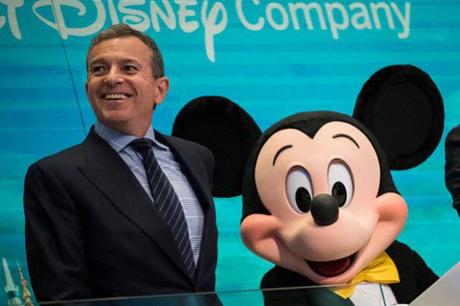A former actor and SAG president once said, "Government is not the solution to our problems; Government IS the problem." Donald Trump, the De-Regulator in Chief, was clearly listening when Ronald Reagan uttered those famous words during his first inaugural address back in 1980. By some (admittedly flawed) measures, Trump's administration has slashed federal regulations at a rate unseen since Reagan's early days. Now, Trump's Justice Department might just do away with a regulation which goes back to the days when Reagan was just a B-Movie actor in the Warner Bros. studio system back in the 30s and 40s.
The Original Report (via Hollywood Reporter):
The U.S. Department of Justice on Thursday announced it would be opening up a review of the famous "Paramount Consent Decrees," otherwise known as various restrictions on the way that major film studios distribute films to movie theatres.
Now, let's all open up our Film History 101 books and turn to the chapter on the death of the studio system. Find the page with the headline: United States v. Paramount Pictures, Inc.
Back in the day, the studios were allowed to both make the movies and own the theaters showing the movies. So, by 1938 the studios owned 70% of all theaters in major cities, 60% in smaller cities, and they conspired to dictate ticket prices and force the competition to buy multiple movies, often sight unseen, just for the chance to exhibit something like Gone With the Wind. This monopoly over production and distribution/exhibition led to a series of court cases and eventually a 1948 Supreme Court ruling against the studios (the case says Paramount, but it was against all of them), thus beginning a decade-long period in which the studios gradually sold off their theaters or spun their theatrical arms off into wholly new corporations:
The Justice Department's Antitrust Division, led by Trump appointee Makan Delrahim, who is still appealing his defeat in the AT&T-Time Warner case but is otherwise decidedly hands-off in his approach to monopolies, thinks it's high time we do away with all that.
Actually, this doesn't quite mean what we normally think it does. THR has further explanation:
Although the ramifications of [the Paramount] decision were significant the Consent Decrees have been very misunderstood. While the Supreme Court felt divestment was a proper remedy, it also ruled "we see no reason to place a ban on this type of ownership, at least so long as theatre ownership by the five majors is not prohibited." The case was remanded to a district court for further inquiry, and after a few years of more fighting, each of the studios settled, which resulted in the Paramount Consent Decrees that exist today. Contrary to popular misconception, there's no rule barring big movie studios from owning movie exhibition houses.
The Consent Decrees have been on the books since 1949 and do not have a sunset clause. As part of a larger crackdown on such statutes, the Justice Department wants to know if the Decrees should now be modified or eliminated entirely. Does it still make sense in 2018, they wonder, to forbid the studios from engaging in any of the following practices?:
The decrees ban various motion picture distribution practices, including block booking (bundling multiple films into one theatre license), circuit dealing (entering into one license that covered all theatres in a theatre circuit), resale price maintenance (setting minimum prices on movie tickets), and granting overbroad clearances (exclusive film licenses for specific geographic areas)."
At the moment, the Justice Department isn't proposing any specific modifications. Instead, it's more like "Man, these rules are old. Like, Humphrey Bogart old. Hey, movie people, let us know if we should just get rid of them." As such, while Delrahim's team conducts their review there is a 30-day commentary period for the public. The Department specifically requests any " motion picture producers, distributors, and exhibitors to provide the Division with information or comments relevant to whether the Paramount Decrees, in whole or in part, still are necessary to protect competition in the motion picture industry."

Eliminating the Decrees entirely would return us to a pre-1948 period where Disney could hypothetically dictate ticket prices to theaters and threaten to sign exclusive deals with certain regional theater chains if other exhibitors don't give them a bigger cut of ticket sales. Fox-owned Disney could force theaters wanting to play Avatar 2 to commit to also playing a bunch of Fox Searchlight indies, sight unseen. That might seem draconian, but just last year Disney forced theater owners wanting to play Last Jedi to fork over as much as 70% of ticket sales (standard rate is 50/50) and commit to showing the movie in their largest auditorium for 4 weeks.

No wonder the theaters were so aggressive with their Last Jedi- adorned concessions:
It's not just Disney. Even under the current rules, Warner Bros. and Sony have been sued for colluding with AMC to deprive smaller theater chains from some of their movies. If officially freed from the Paramount Decrees, who knows what shit they'll all try to pull.
On the opposite, possibly more positive end, indie distributors could agree to theaters lowering ticket prices for their movies if it means they'll be putting more butts in seats ( although applying dynamic pricing to film attendance isn't supported by at least one leading economist). Netflix could more openly go out and gobble up a bunch of theaters to be used for its forthcoming awards runs f or movies like Alfonso Cuaron's Roma and Paul Greengrass' 22 July.
Also, counter to the nightmare scenario I described with Disney strong arming the theaters into higher prices it's worth nothing that studio executives have made an annual art out of complaining about ever-rising ticket prices. If given more leverage in the scenario, would they really then force the theaters to charge even more? Barak Orbach's extensive Yale Journal of Regulation review of ticket pricing throughout movie history concluded market forces, more so than any kind of regulation or lack thereof, "have shaped the industry's pricing systems." As such, wouldn't the studios simply continue on with the industry's current path of exploring subscription models like AMC's A-List?
The Justice Department isn't exactly wrong to simply ask if the Decrees make sense anymore. They were first passed in 1949, at which point most movie theaters were single-screen and most movies gradually made their way through the country, starting in the big cities before circling out. Now, multiplexes litter the land, all major movies open nationwide, and there's an entirely new distribution system in place via streaming and online rental. Today, concepts like block-booking don't present as much of a threat to a multiplex.
But, the possibility still exists that should the Justice Department eliminate or heavily modify the Decrees the movie theaters, which are increasingly vulnerable, might sacrifice even more power to the studios (or simply end up being bought out) and we all might end up paying for it, literally.
What do you think? Let me know in the comments. Or just go o ver to the Justice Department's site. Comments for this particular review are due on or before September 4, 2018.

